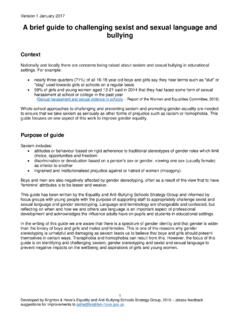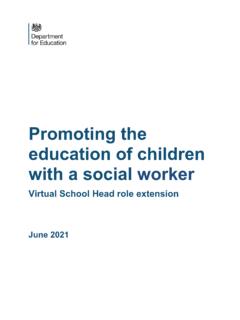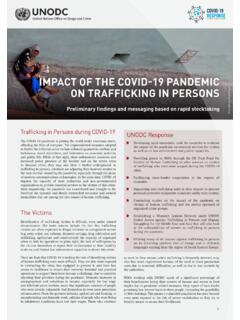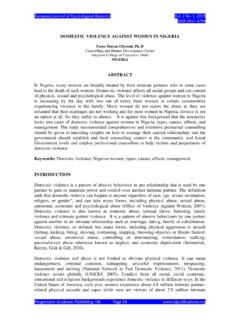Transcription of Working Together to improve Professional Curiosity
1 1 The Brighton & Hove Local Safeguarding Children Board s Business Plan 2013-16 identifies four key areas of concern to focus on. These are: Neglect, Sexual Abuse, Sexual Exploitation, and Early Help. Throughout the years we have been producing a feature on each of these forms of child abuse. This bulletin on Professional Curiosity spans all four of our priorities and is an essential part of Working Together to keep children safe. In this bulletin we will raise awareness of the need for respectful uncertainty, help you spot the signs of when a parent may be using disguised compliance, and let you know where & how to access help & services. If you have any feedback on this bulletin please contact LSCB Business Manager, Mia Brown at Working Together to improve Professional Curiosity January 2017 Professionals will often come into contact with a child, young person or their family when the child is vulnerable to harm.
2 These interactions present crucial opportunities for protection. Responding to these opportunities requires the ability to recognise (or see the signs of) vulnerabilities and potential or actual risks of harm, maintaining an open stance of Professional Curiosity (or enquiring deeper), and understanding one s own responsibility and knowing how to take action. Children rarely disclose abuse and neglect directly to practitioners and, if they do, it will often be through unusual behaviour or comments. This makes identifying abuse and neglect difficult for professionals across agencies. We know that it is better to help children as early as possible, before issues get worse. That means that all agencies and practitioners need to work Together the first step is to be professionally curious.
3 Professional Curiosity and a real willingness to engage with children and their families are vital to promote safety and stability for families . Professor Harry Ferguson has written about the importance of Curiosity during home visits and uses the examples of the Baby Peter and Daniel Pelka cases. He highlights the need for authentic, close relationships with children of the kind where we see, hear and touch the truth of their experience and are able to act on it and to achieve similar closeness with parents / carers. In the Climbi inquiry, Lord Laming suggested social workers needed to practice respectful uncertainty , applying critical evaluation to any information they receive and maintaining an open mind.
4 In safeguarding the term safe uncertainty (Mason 1993) is used to describe an approach which is focused on safety for children but that takes into account changing information, different perspectives and acknowledges that certainty may not be achievable. Professional Curiosity is the capacity and communication skill to explore and understand what is happening within a family rather than making assumptions or accepting things at face value. Curious professionals will spend time engaging with families on visits. They will know that talk, play and touch can all be important to observe and consider. Do not presume you know what is happening in the family home ask questions and seek clarity if you are not certain.
5 Do not be afraid to ask questions of families , and do so in an open way so they know that you are asking to keep the children safe, not to judge or criticise. Be open to the unexpected, and incorporate information that does not support your initial assumptions into your assessment of what life is like for the child in the family. Worried about a child? Call MASH 01273 290400 emergency out of hours 01273 335905 What do we mean by Professional Curiosity ? 2 Working Together to Safeguard Children (2015) makes clear the legal framework and the expectations on different professionals. Safeguarding is everyone's responsibility, and where professionals are concerned each and every agency has a role to play in safeguarding and protecting children.
6 This guidance highlights the following factors that highlight the need for all of us to strive to improve Professional Curiosity and Professional courage: The views and feelings of children are actually very difficult to ascertain Professionals do not always listen to adults who tried to speak on behalf of the child and who may have important information to contribute Parents and carers can easily prevent professionals from seeing and listening to the child Professionals can be fooled with stories we want to believe are true Effective multi agency work needs to be co-ordinated Challenging parents (and colleagues) requires expertise, confidence, time and a considerable amount of emotional energy Thinking the Unthinkable Working Together to Safeguard Children (2015)
7 Makes clear the legal framework and the expectations on different professionals. Safeguarding is everyone's responsibility, and where professionals are concerned each and every agency has a role to play in safeguarding and protecting children. Professional Courage And Curiosity The views and feelings of children are actually very difficult to ascertain Professionals do not always listen to adults who tried to speak on behalf of the child and who may have important information to contribute Parents and carers can easily prevent professionals from seeing and listening to the child Professionals can be fooled with stories we want to believe are true Effective multi agency work needs to be co-ordinated Challenging parents (and colleagues) requires expertise, confidence, time and a considerable amount of emotional energy improve Professional Curiosity and Professional courage.
8 Many domestic Homicide Reviews and Serious Case Reviews refer to a lack of Professional Curiosity or respectful uncertainty. Practitioners need to demonstrate a non-discriminatory approach and explore the issues to formulate judgements that translate into effective actions in their dealings with families . In particular it is vital that professionals understand the complexity of domestic abuse and are curious about what is happening in the child, adult and perpetrator's life. Professional Curiosity is much more likely to flourish when practitioners: are supported by good quality training to help them develop; have access to good management, support and supervision 'walk in the shoes' (have empathy) of the child and/or adult to consider the situation from their lived experience; remain diligent in Working with the family and developing the Professional relationships to understand what has happened and its impact on all family members.
9 Always try to see all parties separately. Working with families where there is domestic violence can be very challenging, and professionals should not take everything they are told at face value. This is particularly so when a victim is not being seen alone, and we should also be alert to the following behaviours which should excite our Professional Curiosity : the victim waits for her/his partner to speak first; the victim glances at her/his partner each time they speak, checking her/his reaction; the victim smooths over any conflict; the suspected perpetrator speaks for most of the time; the suspected perpetrator sends clear signals to the victim, by eye/body movement, facial expression or verbally, to warn them; the suspected perpetrator has a range of complaints about the victim, which they do not defend.
10 If these signals are present, the practitioner should find a way of seeing the suspected victim alone. Staff must be cognisant to the needs of young people who may be experiencing inequality and/or violence in their relationships. Professionals, however curious, cannot protect children and adults by Working in isolation. domestic abuse requires a multi-agency response and families and communities also have a vital role to play in protecting children and adults. The Portal provides a single point of contact for victims and survivors of domestic or sexual abuse and violence, helping them to find the right help, advice and support. The Portal can also give advice and support to friends, families and professionals: The LSCB, in association with Rise, who have been supporting victims of domestic abuse in Brighton for over 20 years, provide training for professionals on domestic Violence & Abuse: The Impact on Children & Young People.






